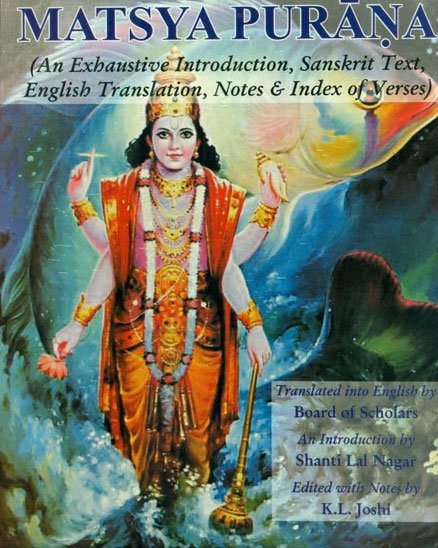The Matsya Purana (critical study)
by Kushal Kalita | 2018 | 74,766 words | ISBN-13: 9788171103058
This page relates ‘Rajadharma (the duty of a king)’ of the English study on the Matsya-purana: a Sanskrit text preserving ancient Indian traditions and legends written in over 14,000 metrical verses. In this study, the background and content of the Matsyapurana is outlined against the cultural history of ancient India in terms of religion, politics, geography and architectural aspects. It shows how the encyclopedic character causes the text to deal with almost all the aspects of human civilization.
Part 3 - Rājadharma (the duty of a king)
The king was the head of the state and he was made a king for protecting the people and their lives. The meaning of the term rājadharma is very wide as it covers the entire responsibility of a king in administering the whole state. Etymologically the term rājadharma means the duty of a king or a law or rule relating to kings.[1] Emphasizing on rājadharma the Mahābhārata has maintained that rājadharma is greater than all the dharmas which is the principal of other dharmas. It has advocated that all castes should be protected and all renouncements are included in rājadharma only.[2] Rājadharma has been a topic of discussion from very early time especially in the texts of dharmaśāstras. The Āpastambadharmasūtra has covered the whole topic on rājadharma in a brief discussion.[3] The Manusmṛti has discussed about the duties of a king in seven long chapters.
The Rāmāyaṇa has dealt with the duties of a king in the Ayodhyākāṇḍa where Rāma gave advice on rājadharma to Bharata. He said that the duty of a king is not towards the human beings only but to the whole creature also.[4] Some other aspects of king’s duty have been specified in the Laṅkākāṇḍa[5] and Araṇyakāṇḍa.[6]
The Mahābhārata has carried a long discussion on rājadharma. This epic has given rājadharma the most important place among other sciences while saying it as the refuge of all branches of knowledge[7] . The kingly duty, which is called rājadharma, is the highest duty[8] and it is the shelter of all living beings.[9] The Mahābhārata has also presented a conversation between Bhīṣma and Yudhiṣṭhira where Bhīṣma has told about rājadharma in detail. It is said there that the main responsibility of a king is to protect his country and countrymen and be ready to die in war. The essential qualifications and duties of a king, the education system and the administrative abilities of a king are the other subjects included in rājadharma as described therein.[10]
The Viṣṇupurāṇa has said that anarchy prevails in a state without a king. The king should perform sacrifices for the betterment of its people and at the same time he should implement punishment and reward to the guilty and the good one respectively.[11] The Vāyupurāṇa also states about the duties of a king.[12] The Mārkaṇḍeyapurāṇa has stated that a king should assume the five forms of five deities viz., the sun, the moon, Indra, Yama and the wind while governing the state.[13] The Agnipurāṇa has also dealt with the topic of rājadharma where it has maintained that a king should protect the life of his subjects.[14]
Thus, it can be assumed that the ancient texts have given importance to rājadharma as because the accomplishment of the responsibilities and duties by a king could only secure the strength and scientific development of a state and its people as a whole. As the head of a state the king and his performance of the duty can bring good or ill fate to the state in general and its habitants in particular. Even if the example of today’s world is taken, it is seen that the prosperity and progress of a state or country are achieved through the personality of its working ruler be it the king, president or the prime minister. So, to maintain the duties entrusted to a king is the responsibility of the king himself. If the king neglects his duty then the world becomes confused and disorderly situation will arise. Hence, the kingly duty, i.e., rājadharma destroys all evils just as the sun dispels the darkness. Just as the rein controls the horse and the hook controls the elephant so also the king controls all.[15] This dharma was created and followed by Lord Viṣṇu and hence no one can ignore it.[16]
Footnotes and references:
[2]:
Mahābhārata, 12.63.27
[3]:
Āpastambadharmasūtra, 2.925.1
[5]:
Ibid., 6.6.11
[6]:
Ibid., 3.6
[8]:
rājñāṃ vai paramo dharma iti dharmavido viduḥ/ Ibid., 12.56.2
[9]:
sarvasya jīvalokasya rājadharmo hi parāyaṇam/ Ibid., 12.56.3
[10]:
Ibid, 12.56-58
[11]:
Cf., Viṣṇupurāṇa , 3.8.21-40
[12]:
Vāyupurāṇa , 8.162
[13]:
Mārkaṇḍeyapurāṇa , 27.21-26
[14]:
[15]:
Mahābhārata, 12.56.5-7
[16]:
Ibid., 12.65.33
